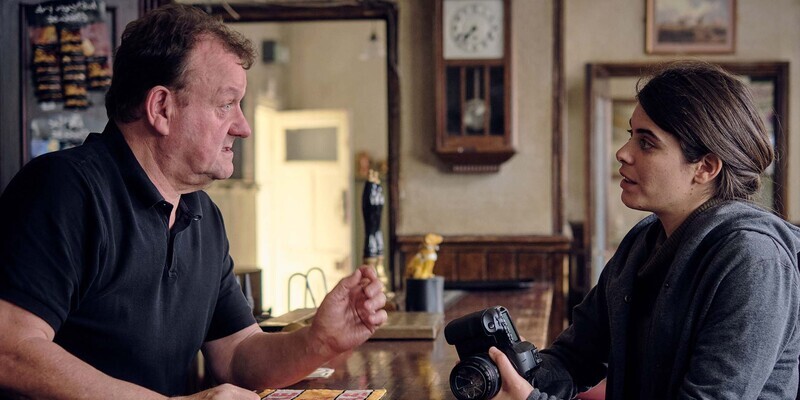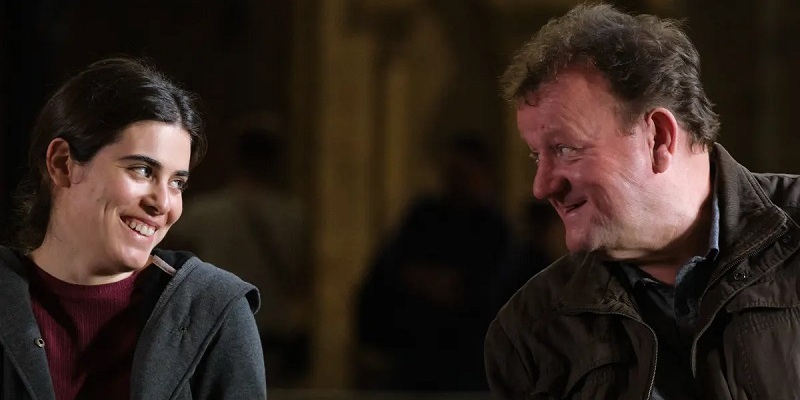
Review by
Eric Hillis
Directed by: Ken Loach
Starring: Dave Turner, Elba Mari, Chris McGlade, Debbie Honeywood, Trevor Fox

If the reports are to be believed, The Old Oak represents
Ken Loach's swan song. If this is indeed Loach's last hurrah,
he's going out with his best movie in a couple of decades. It's also a
film that sums up Loach's best and worst tendencies. At his best, Loach
has an ability to coax remarkable performances out of amateur
performers, embodying characters we develop a fondness for as the
narrative develops. At his worst, Loach can often push aside his
character's humanity, reducing them to a crude mouthpiece for his
political views. Both aspects of Loach are present here.

Having featured in minor roles in Loach's last couple of films,
Dave Turner gets the lead role here of TJ Ballantyne, the
landlord of the titular Durham pub. Both TJ and his pub have seen better
days. He's nursing the wounds of a divorce and mourning a son who
refuses to speak to him. His pub is crumbling around him, embodied by
his frustration in trying to get the letter K to stay in place on the
pub's frontage.
Still, mustn't grumble, others have it worse after all. Enter a busload
of Syrian refugees placed into cramped houses bought up by vulture
funds. Among them is Yari (Elba Mari), a budding young
photographer who has her camera broken by a local yob upon arrival. When
TJ steps in to help her out, she becomes attached to him. This places TJ
in the sights of his disgruntled customers, who make crude jokes about
his relationship with the young Syrian. But the ribbing turns serious
when a group of angry locals ask TJ to open up his back room so they can
hold an anti-immigrant meeting. Citing insurance reasons, TJ declines
their request, yet he willingly opens up the room when Yari suggests
holding communal dinners as a way for the two communities to bond.

Loach is practically the embodiment of what we think of as British
social realist filmmaking, but The Old Oak draws heavily
on the sort of social dramas that were popular in the golden age of
Hollywood. It's essentially a western (or perhaps in this case, a
North-Eastern?), with Turner's TJ the sort of good man torn between
doing the right thing and placing himself in danger that Henry Fonda and
James Stewart so often played. Like the heroes of so many classic
westerns, TJ initially just wants to keep his head down, ignoring his
customers' racist remarks. But there comes a point in every western in
which the hero must finally take a stand. Of course, a Ken Loach film
isn't going to culminate in a shootout, but it does build up to a
confrontation of sorts. A classic trope of the western is the idea of
the hero being betrayed by a friend who has chosen a different path, and
that's what we get here in the figure of Charlie (Trevor Fox).
The two are lifelong friends but Charlie blames his problems on the
immigrants and his reductive "you're either with us or against us"
mentality sees him become an enemy of TJ, yet another blow to a man who
has lost practically everything.
As you might expect, there are occasional digressions into
speechifying. At some point in every Loach film the protagonist will
deliver their own crude version of Chaplin's monologue at the end of
The Great Dictator. It's particularly galling here as it feels incongruous to TJ's
taciturn nature. What's so great about the character of TJ is how he's a
man who clearly possesses neither the vocabulary nor the confidence to
express his feelings, and some of the film's most touching moments
involve him sitting awkwardly as he's taken aback by gestures of
kindness or seething silently as he's mocked by customers he can't
afford to turn against.

Some viewers may complain about Loach's exploitation of refugees from a
foreign conflict in order to highlight his own country's shortcomings,
and it's a fair point. It's also notable how black characters are absent
from the drama until a late crowd scene in which half the extras appear
to be black. Is this Loach's cynical way of getting around BAFTA's
diversity rules?
Such complaints would mask what is a fitting end to Loach's career, one
filled with small moments of humanity that have more impact than any
angry monologue. There's a lovely scene where the atheist TJ and the
Muslim Yari visit Durham cathedral. What the building represents
theologically might not resonate with either of them, but they're moved
by its grandeur, and Yari notes how many such historical buildings in
her own country have been destroyed in the conflict.


